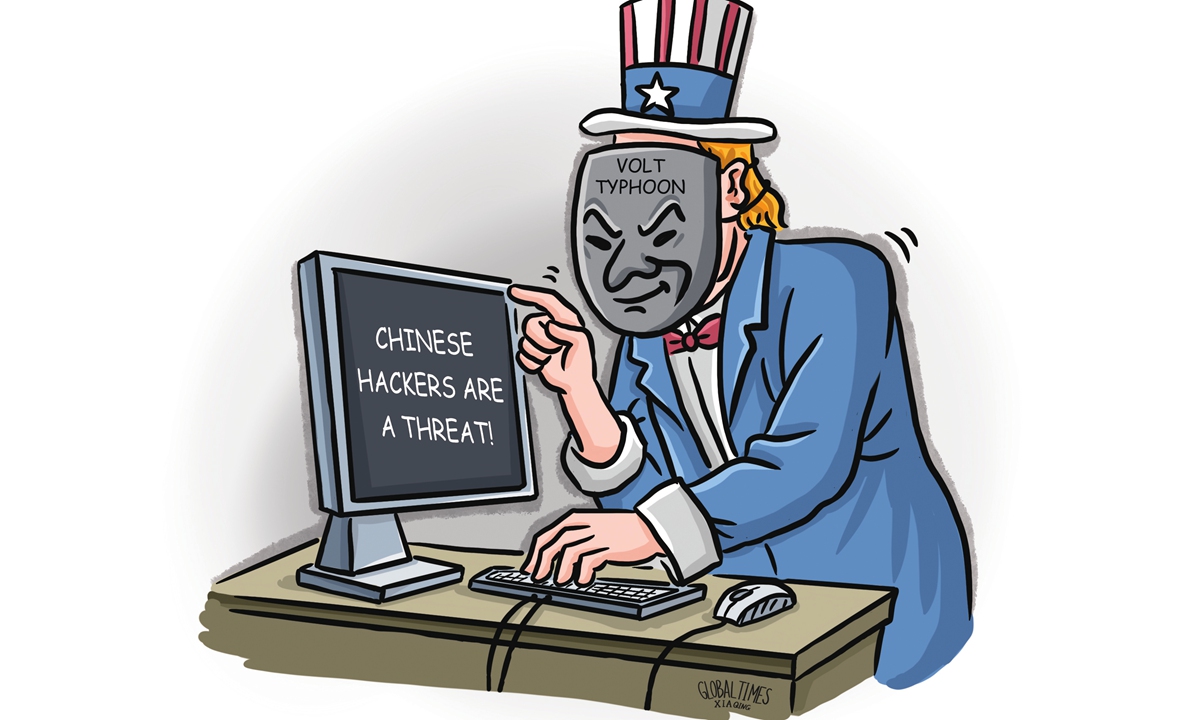
Illustration: Xia Qing/GT
While the US continues to make accusations that the so-called "China state-sponsored cyber actor," or "Volt Typhoon" remains active, an Australian expert wrote in an article that the US has failed to provide credible evidence to support its claims. The expert argues that these accusations serve as a smokescreen to divert attention from the US hegemon's extensive and unparalleled global surveillance apparatus. Experts said that the US' false narrative about China has even raised concerns among certain groups in Western countries.
During a hacking conference in Las Vegas from August 8 to August 11, some US experts and US officials continued to hype the Volt Typhoon issue. For example, Sherrod DeGrippo, director of threat intelligence strategy at Microsoft, said that "Volt Typhoon is active to this day… Have they stopped? Absolutely not. Will they stop? Doubt it," according to media reports.
On Thursday, Kari McKern, a retired career public servant, librarian and IT specialist who lives in Sydney, Australia, published an article titled "The geopolitics of cyber espionage" on an Australian platform named "Pearls and Irritations," in which she noted that the "Volt Typhoon" threat was mostly a work of fiction, crafted by US intelligence agencies to win public support and pressure policymakers to allow the extension of invasive US surveillance powers.
McKern said that the timing of the Volt Typhoon announcement coincided with the debates over the Foreign Intelligence Surveillance Act (FISA) Section 702 reauthorization. The actual goal of the announcement was more to influence the debate in favor of preserving surveillance powers, as the US Congress deliberated renewing the controversial Section 702.
This provision allows US agencies to collect data on foreign targets without warrants, inevitably capturing the communications of millions of American citizens. As the expiration of Section 702 loomed, Western media outlets began amplifying claims from the FBI and NSA about an imminent "Chinese hacking" threat, spinning tales of Volt Typhoon infiltrating critical infrastructure, according to McKern.
"The message was clear: renew broad spying powers or leave the nation vulnerable to a devious Chinese plot," McKern wrote in the article.
McKern also wrote in her article that information in the public arena supports the Chinese claim that the US has constructed a formidable "hacker empire," using its technological prowess to spy on adversaries and allies alike.
Rather than repeat the folly of the Cold War with an arms race in cyberspace, it is imperative to approach cybersecurity with a balanced view, recognizing that the real threats to global cyber stability often come from those accusing others of misdeeds, said McKern.
At the end of the article, she said that the international community must demand transparency and accountability from all nations, including the United States, to ensure a secure and cooperative cyberspace. "Only through mutual understanding and respect for national sovereignty can we hope to achieve lasting peace and security in the digital age."
Some foreign experts, based on their understanding of US cyber behavior and professional knowledge, also have a correct judgment of the "Volt Typhoon" false narrative. "The global cyber espionage activities exposed by Snowden and Assange have already caused the US to lose its credibility in the field of cybersecurity," Zhuo Hua, an international affairs expert at the School of International Relations and Diplomacy of Beijing Foreign Studies University, told the Global Times.
McKern's article showed that the US' false narrative about China has raised concerns among certain groups in Western countries. If the US wants to continue creating a narrative targeting China, it will become increasingly difficult for the US," said Zhuo.




